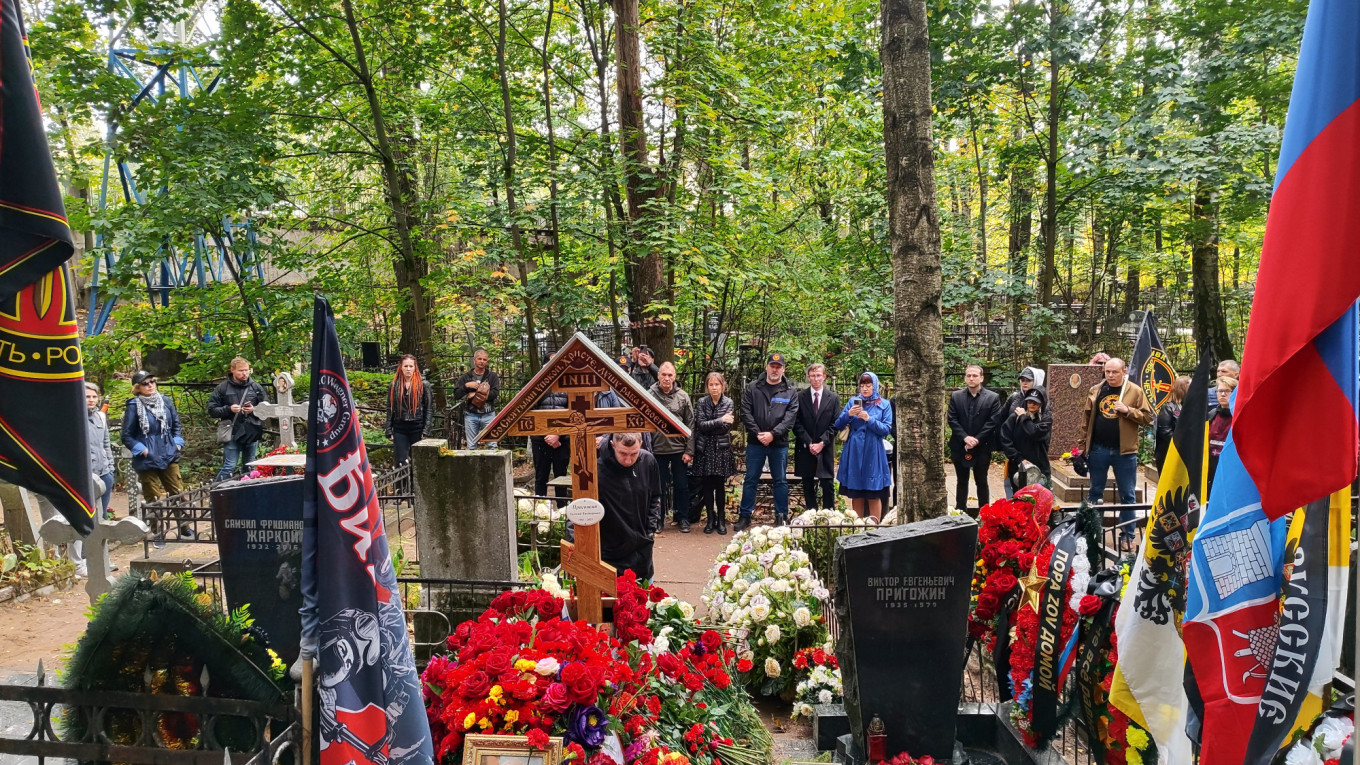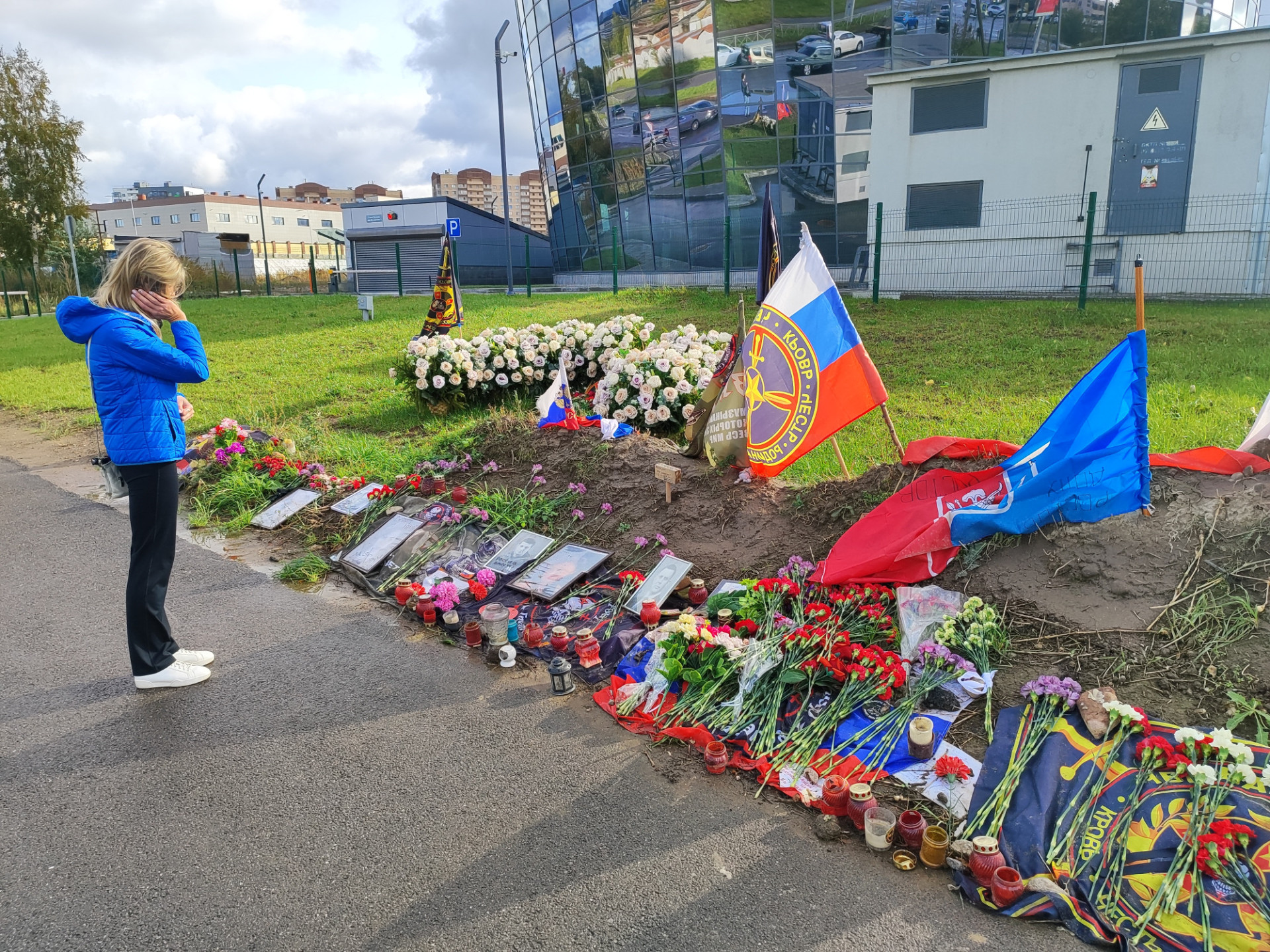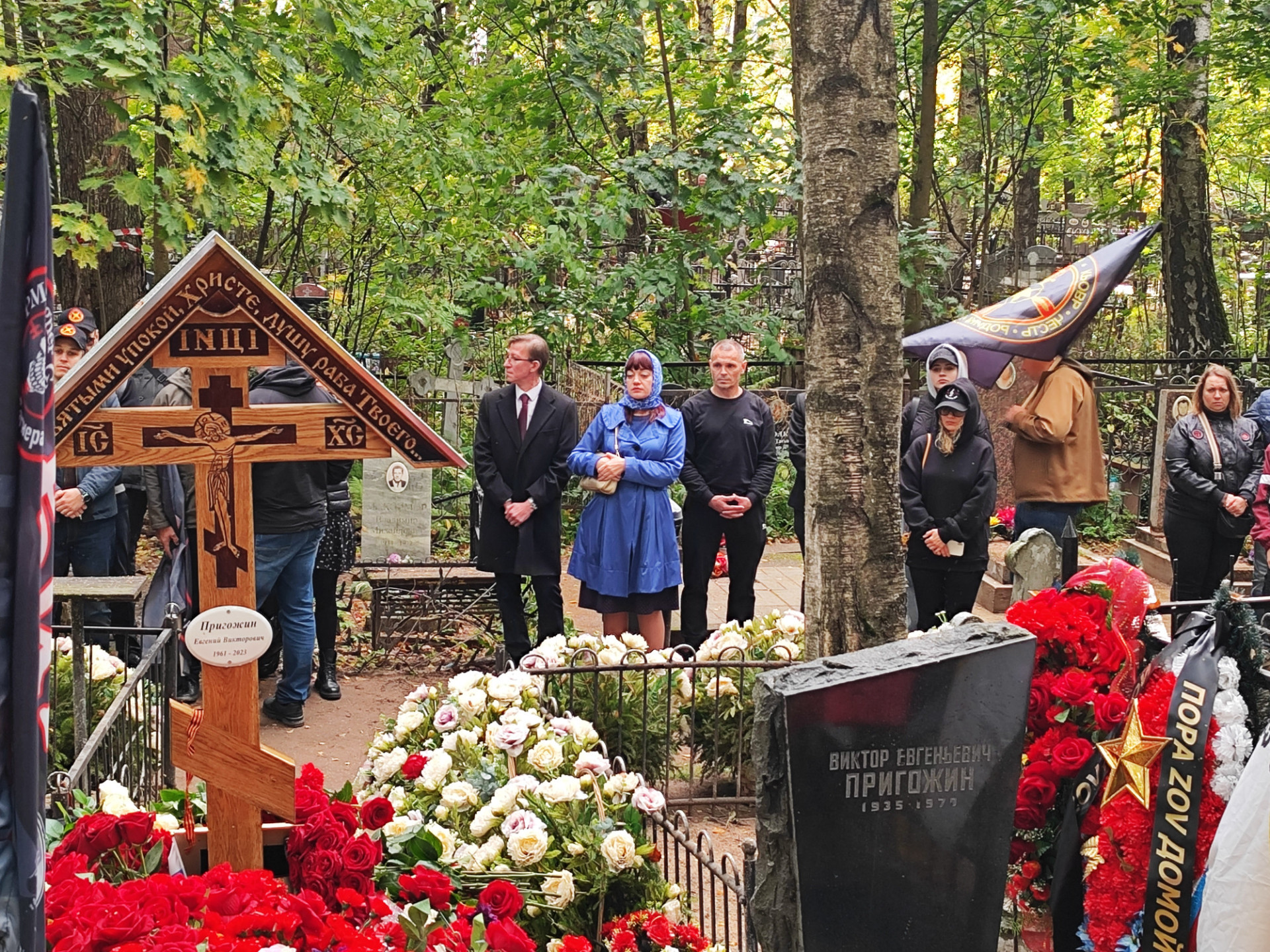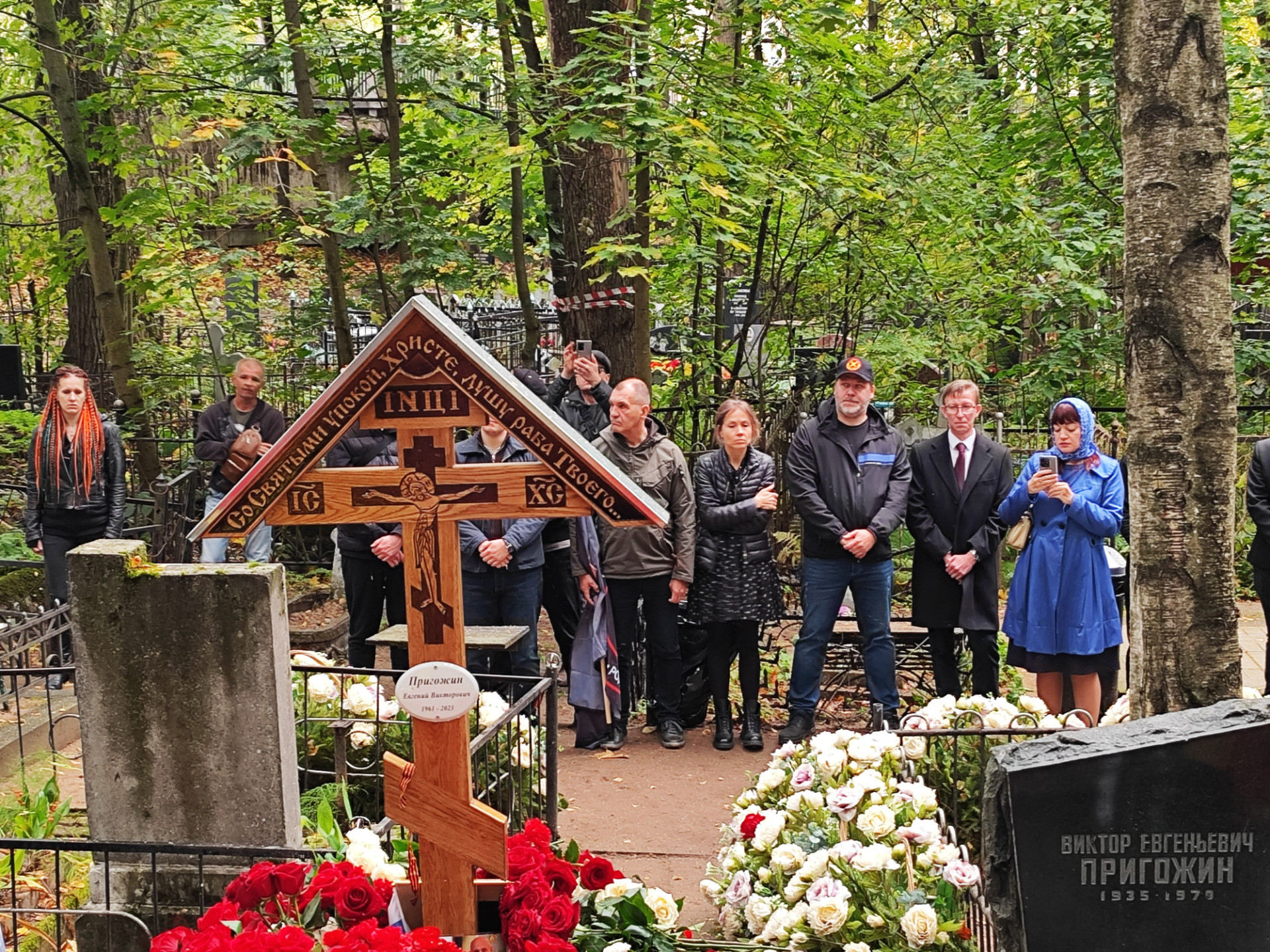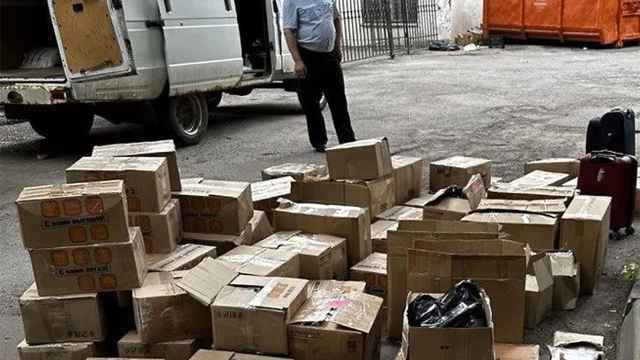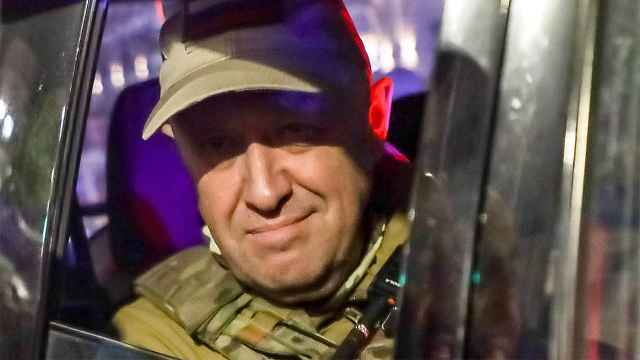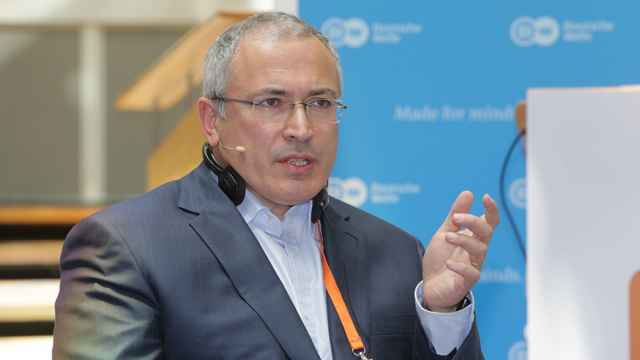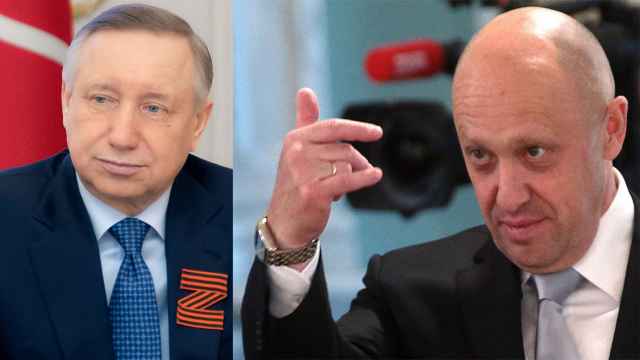ST. PETERSBURG — Dozens of people gathered at Yevgeny Prigozhin's grave site on Sunday to pay tribute to the late Russian mercenary chief on the 40th day since his death in a mysterious plane crash.
According to Orthodox Christian tradition, the souls of the deceased remain on Earth for 40 days before finding their eternal resting place, and it is customary for Russians to mourn for this period.
Cars adorned with Wagner flags and sporting the motto “Blood, Honor, Motherland, Courage” could be seen parked in front of the gates of the Porokhovskoye cemetery in the outskirts of Prigozhin’s hometown Sunday morning.
Wagner supporters and fans, many wearing hats and T-shirts bearing the mercenary group’s logos, laid flowers on Prigozhin’s headstone.
Current and former Wagner fighters in military fatigues also attended the ceremony. Some wore coverings over their faces, while others carried the signs of the wounds they received in battle.
“I feel empty,” Igor, a Wagner fighter in his 20s, said as he smoked a cigarette outside the graveyard. He had just laid flowers at Prigozhin’s grave.
“He was a true hero who wasn't afraid to tell the truth about existing problems,” he continued, referring to Prigozhin's vocal criticism of the Defense Ministry's handling of the war effort.
“Now, there is no such person anymore.”
Prigozhin, his close ally commander Dmitry “Wagner” Utkin, and eight others were killed in the Aug. 23 plane crash in the Tver region between St. Petersburg and Moscow.
The circumstances of the crash remain unclear. While Russian authorities opened a criminal case into the incident, the investigation hasn’t produced any results so far.
This opacity has given rise to the theory that Prigozhin’s death was orchestrated by Russia’s top leadership, who saw the onetime Kremlin ally as a traitor following his aborted armed uprising against the Russian military’s top brass in June.
“It’s the government who did it, I am 100% sure,” said Andrei, 57, a Wagner supporter who came to pay tribute at Prigozhin’s grave.
“They betrayed him and the people of Russia,” he continued.
The Kremlin has denied any involvement in the plane crash, calling speculation of President Vladimir Putin’s involvement “an absolute lie.”
Many of Prigozhin’s supporters expressed hopes that his death was staged and that he and the other Wagner leaders are still alive.
“Prigozhin and Utkin wouldn't fly together on the same flight,” said Anna, 35, who came to the graveyard with her young son. “We don’t want to believe they are dead.”
“We didn’t see his body, nor is there any proof that he boarded that plane,” agreed Alexander Kolos, a local entrepreneur and Wagner supporter.
The Moscow Times previously reported, citing Russian officials, that the Kremlin was concerned by Prigozhin’s growing popularity following the mutiny, prompting authorities to keep his funeral a secret from the public.
Earlier this week, Wagner-affiliated Telegram channels had announced that ceremonies in memory of Prigozhin and Utkin would take place across the country.
In St. Petersburg, mourners were invited to gather at the Porokhovskoye cemetery, where the businessman was buried next to his father in a private ceremony a month earlier.
People also laid flowers at makeshift street memorials in front of the Wagner Center, the group’s former headquarters in St. Petersburg, and the Patriot Bar, a Prigozhin-owned restaurant that hosted meetups of his supporters and other pro-invasion figures.
According to local media, Prigozhin’s mother Violetta and his son Pavel visited the businessman’s grave together with a priest who performed a funeral prayer.
The future of Wagner, which led Russia’s forces in Ukraine for months, remains shrouded in uncertainty following the death of its leader.
Many analysts say the private military company, which also operates in several African countries and Syria, will cease to exist as an autonomous organization and its fighters will be absorbed into other military units under the direct control of the Defense Ministry.
Last week, Putin was shown speaking with former Wagner commander Andrei Troshev in a televised meeting, ordering him to form “volunteer units” for the war in Ukraine.
According to the Wagner-linked Telegram channel Grey Zone, Prigozhin’s son Pavel is negotiating the return of Wagner units to Ukraine as part of the Russian National Guard (Rosgvardia).
As pointed out by Ukrainian sources, disjointed groups of Wagner fighters have already returned to the front and are now engaged in the area around Bakhmut.
“Right now nothing is clear, we are waiting for news from the commanders,” said Igor, the young Wagner fighter.
Some Wagner mercenaries appear to believe that the group will continue to operate as a separate military force even after Prigozhin’s death.
“Be sure that Wagner will be never under the control of the Defense Ministry,” said another former Wagner fighter who wished to stay anonymous.
“Wagner will continue to work as it always did,” said Andrei, a Wagner mercenary also known by his call name “Chaliapin.”
“I will go back to fight as soon as I recover,” he continued, hinting at his arm in a cast.
Whether it will be in Africa, Ukraine, or anywhere else in the world, it doesn’t matter to him.
“I’ll go wherever they’ll tell me to,” he said.
A Message from The Moscow Times:
Dear readers,
We are facing unprecedented challenges. Russia's Prosecutor General's Office has designated The Moscow Times as an "undesirable" organization, criminalizing our work and putting our staff at risk of prosecution. This follows our earlier unjust labeling as a "foreign agent."
These actions are direct attempts to silence independent journalism in Russia. The authorities claim our work "discredits the decisions of the Russian leadership." We see things differently: we strive to provide accurate, unbiased reporting on Russia.
We, the journalists of The Moscow Times, refuse to be silenced. But to continue our work, we need your help.
Your support, no matter how small, makes a world of difference. If you can, please support us monthly starting from just $2. It's quick to set up, and every contribution makes a significant impact.
By supporting The Moscow Times, you're defending open, independent journalism in the face of repression. Thank you for standing with us.
Remind me later.



